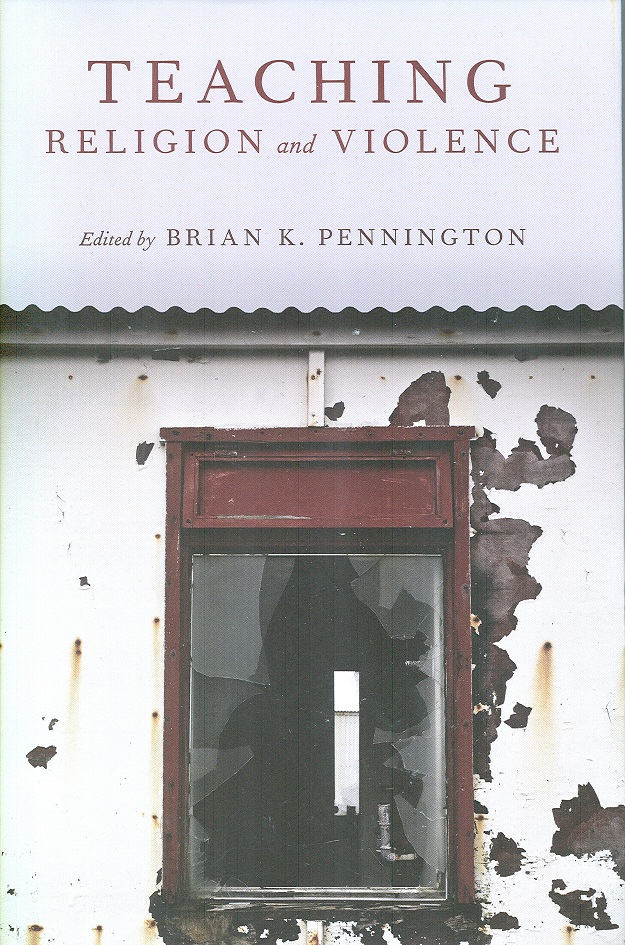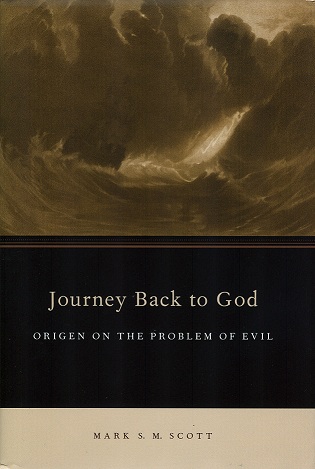|
Welcome to The Book Corner. In each March and October issue, we will feature books that have recently been published by Oxford University Press in the various AAR/OUP book series. The books featured in this issue were published between January and June 2012. For more books published in the various series, visit www.aarweb.org/Publications/Books.
Pennington, Brian, ed. Teaching Religion and Violence. Oxford University Press, 2012.
 Many people now see religious violence as one of the defining characteristics of the modern world. Instructors are often asked about it in their courses that deal with religion. Classroom discussion of violence committed in the name of religion can either open the door to a more subtle appreciation of complex and divisive social realities or allow students to display the kind of ignorance, prejudice, and recalcitrance that can derail critical analysis. The etiology of religious violence requires careful distinctions that instructors must work hard to communicate even in the best of classroom circumstances. Many people now see religious violence as one of the defining characteristics of the modern world. Instructors are often asked about it in their courses that deal with religion. Classroom discussion of violence committed in the name of religion can either open the door to a more subtle appreciation of complex and divisive social realities or allow students to display the kind of ignorance, prejudice, and recalcitrance that can derail critical analysis. The etiology of religious violence requires careful distinctions that instructors must work hard to communicate even in the best of classroom circumstances.
Teaching Religion and Violence represents the accumulated professional insights and experiences of expert college and university instructors who teach and write about the intersections of religion and violence. Some contributors summarize the teachings of the major religious traditions of the world on such topics as warfare, sacrifice, terrorism, and the coercive propagation of a faith. They examine the histories of the traditions they discuss as well as recent global events to provide teachers the resources and classroom strategies that are effective for cultivating critical thinking and interdisciplinary inquiry among college students about these topics  and about the role of religious discourse in human civilization. Others describe their own courses and classroom experiences and share the lessons they have learned about how to foster careful analysis among a generation of students coming of age in an increasingly mediated, saturated, conflict-ridden world. Each essay in this book, as well as the volume as a whole, is firmly grounded in the theoretical literature on religion and violence, in the theory of pedagogy, and in the collective experience of its authors. and about the role of religious discourse in human civilization. Others describe their own courses and classroom experiences and share the lessons they have learned about how to foster careful analysis among a generation of students coming of age in an increasingly mediated, saturated, conflict-ridden world. Each essay in this book, as well as the volume as a whole, is firmly grounded in the theoretical literature on religion and violence, in the theory of pedagogy, and in the collective experience of its authors.
ISBN: 978-0-19-5372427
Scott, Mark. Journey Back to God: Origen on the Problem of Evil. Oxford University Press, 2012.
 Journey Back to God book explores Origen of Alexandria’s creative, complex, and controversial treatment of the problem of evil. It argues that his layered cosmology functions as a theodicy that deciphers deeper meaning beneath cosmic disparity. Origen asks: why does God create a world where some suffer more than others? On the surface, the unfair arrangement of the world defies theological coherence. In order to defend divine justice against the charge of cosmic mismanagement, Origen develops a theological cosmology that explains the ontological status and origin of evil as well as its cosmic implications. Journey Back to God book explores Origen of Alexandria’s creative, complex, and controversial treatment of the problem of evil. It argues that his layered cosmology functions as a theodicy that deciphers deeper meaning beneath cosmic disparity. Origen asks: why does God create a world where some suffer more than others? On the surface, the unfair arrangement of the world defies theological coherence. In order to defend divine justice against the charge of cosmic mismanagement, Origen develops a theological cosmology that explains the ontological status and origin of evil as well as its cosmic implications.
Origen’s theodicy hinges on the journey of the soul back to God. Its themes correlate with the soul’s creation, fall and descent into materiality, gradual purification, and eventual divinization. The world, for Origen, functions as a school and hospital for the soul where it undergoes the necessary education and purgation. Origen carefully calibrates his cosmology and theology. He portrays God as a compassionate and judicious teacher, physician, and father who employs suffering for  our amelioration. Journey Back to God frames the systematic study of Origen’s theodicy within a broader theory of theodicy as navigation, which signifies the dynamic process whereby we impute meaning to suffering. It unites the logical and spiritual facets of his theodicy, and situates it in its third century historical, theological, and philosophical context, correcting the distortions that continue to plague Origen scholarship. Furthermore, the study clarifies his ambiguous position on universalism within the context of his eschatology. Finally, it assesses the cogency and contemporary relevance of Origen’s theodicy, highlighting the problems and prospects of his bold, constructive, and optimistic vision. our amelioration. Journey Back to God frames the systematic study of Origen’s theodicy within a broader theory of theodicy as navigation, which signifies the dynamic process whereby we impute meaning to suffering. It unites the logical and spiritual facets of his theodicy, and situates it in its third century historical, theological, and philosophical context, correcting the distortions that continue to plague Origen scholarship. Furthermore, the study clarifies his ambiguous position on universalism within the context of his eschatology. Finally, it assesses the cogency and contemporary relevance of Origen’s theodicy, highlighting the problems and prospects of his bold, constructive, and optimistic vision.
ISBN: 978-0-19-9841141
|
![PDF-NOTE: Internet Explorer Users, right click the PDF Icon and choose [save target as] if you are experiencing problems with clicking.](http://rsnonline.org/templates/rsntemplate-smallmasthead/images/pdf_button.png)



 Many people now see religious violence as one of the defining characteristics of the modern world. Instructors are often asked about it in their courses that deal with religion. Classroom discussion of violence committed in the name of religion can either open the door to a more subtle appreciation of complex and divisive social realities or allow students to display the kind of ignorance, prejudice, and recalcitrance that can derail critical analysis. The etiology of religious violence requires careful distinctions that instructors must work hard to communicate even in the best of classroom circumstances.
Many people now see religious violence as one of the defining characteristics of the modern world. Instructors are often asked about it in their courses that deal with religion. Classroom discussion of violence committed in the name of religion can either open the door to a more subtle appreciation of complex and divisive social realities or allow students to display the kind of ignorance, prejudice, and recalcitrance that can derail critical analysis. The etiology of religious violence requires careful distinctions that instructors must work hard to communicate even in the best of classroom circumstances. and about the role of religious discourse in human civilization. Others describe their own courses and classroom experiences and share the lessons they have learned about how to foster careful analysis among a generation of students coming of age in an increasingly mediated, saturated, conflict-ridden world. Each essay in this book, as well as the volume as a whole, is firmly grounded in the theoretical literature on religion and violence, in the theory of pedagogy, and in the collective experience of its authors.
and about the role of religious discourse in human civilization. Others describe their own courses and classroom experiences and share the lessons they have learned about how to foster careful analysis among a generation of students coming of age in an increasingly mediated, saturated, conflict-ridden world. Each essay in this book, as well as the volume as a whole, is firmly grounded in the theoretical literature on religion and violence, in the theory of pedagogy, and in the collective experience of its authors. Journey Back to God book explores Origen of Alexandria’s creative, complex, and controversial treatment of the problem of evil. It argues that his layered cosmology functions as a theodicy that deciphers deeper meaning beneath cosmic disparity. Origen asks: why does God create a world where some suffer more than others? On the surface, the unfair arrangement of the world defies theological coherence. In order to defend divine justice against the charge of cosmic mismanagement, Origen develops a theological cosmology that explains the ontological status and origin of evil as well as its cosmic implications.
Journey Back to God book explores Origen of Alexandria’s creative, complex, and controversial treatment of the problem of evil. It argues that his layered cosmology functions as a theodicy that deciphers deeper meaning beneath cosmic disparity. Origen asks: why does God create a world where some suffer more than others? On the surface, the unfair arrangement of the world defies theological coherence. In order to defend divine justice against the charge of cosmic mismanagement, Origen develops a theological cosmology that explains the ontological status and origin of evil as well as its cosmic implications. our amelioration. Journey Back to God frames the systematic study of Origen’s theodicy within a broader theory of theodicy as navigation, which signifies the dynamic process whereby we impute meaning to suffering. It unites the logical and spiritual facets of his theodicy, and situates it in its third century historical, theological, and philosophical context, correcting the distortions that continue to plague Origen scholarship. Furthermore, the study clarifies his ambiguous position on universalism within the context of his eschatology. Finally, it assesses the cogency and contemporary relevance of Origen’s theodicy, highlighting the problems and prospects of his bold, constructive, and optimistic vision.
our amelioration. Journey Back to God frames the systematic study of Origen’s theodicy within a broader theory of theodicy as navigation, which signifies the dynamic process whereby we impute meaning to suffering. It unites the logical and spiritual facets of his theodicy, and situates it in its third century historical, theological, and philosophical context, correcting the distortions that continue to plague Origen scholarship. Furthermore, the study clarifies his ambiguous position on universalism within the context of his eschatology. Finally, it assesses the cogency and contemporary relevance of Origen’s theodicy, highlighting the problems and prospects of his bold, constructive, and optimistic vision.